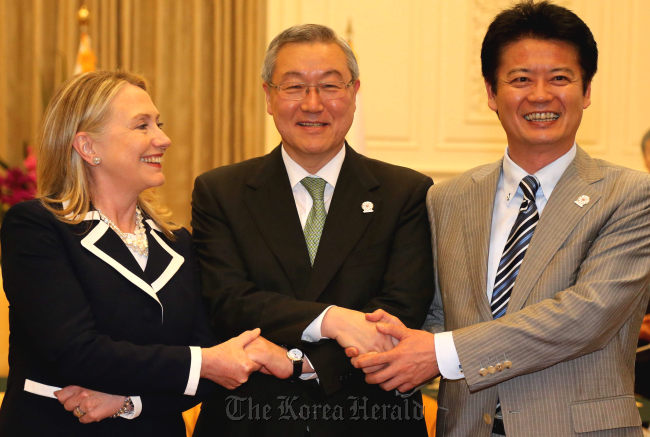S. Korea, U.S., Japan move closer to building trilateral alliance
By 신현희Published : July 12, 2012 - 20:33
PHNOM PENH (Yonhap News) -- South Korea, the United States and Japan announced Thursday the establishment of a three-way security consultative body, laying the groundwork to build a trilateral alliance in the face of North Korean aggression.
The announcement was made after South Korean Foreign Minister Kim Sung-hwan, U.S. Secretary of State Hillary Clinton and Japanese Foreign Minister Koichiro Gemba held a trilateral meeting earlier in the day on the sidelines of the ASEAN Regional Forum.
Clinton hailed the new organization, named the Steering Group and to be based in Washington, as an initiative to "build even deeper connection" among the three nations and across the Asia-Pacific region to "bring even greater order and structure to our three-way partnership."
"We all have a deep stake in greater responsibility to work together to strengthen and update a rules-based order for the Asia-Pacific," Clinton told reporters.
"So we welcome the newly-framed Steering Group. And I look forward to our consultation today and to our continued efforts to build even deeper connections among our three countries," Clinton said.
The death of North Korea's long-time ruler, Kim Jong-il, and the North's botched rocket launch in April "proved the importance of this trilateral framework and the need to keep strengthening it," she said.

The launch of the consultative body reflected Washington's plan to reinforce trilateral policy coordination with Seoul and Tokyo and more efficiently deal with North Korea's growing threats as well as China's rising military influence in the region, Seoul officials said.
"It is the first time that South Korea, the U.S. and Japan have formed such a trilateral consultative body," a senior Seoul diplomat said on the condition of anonymity.
In a joint statement, the three ministers said they "acknowledged the further need for developing trilateral cooperation, based on common interests, for promoting peace, prosperity and stability in the Asia-Pacific region and beyond."
"To cope with changing situations not only on the Korean Peninsula, but also the entire Asia-Pacific region, we believe that our three countries need to seek active and diverse cooperative measures," said South Korean Foreign Minister Kim Sung-hwan.
The three nations "are pursuing open and transparent trilateral cooperation and we are confident that the trilateral cooperation will continue to contribute to the prosperity of the region and the international community as a whole," Kim said.
Seoul and Japan are Washington's close allies in Northeast Asia, although their relations have often been seriously frayed during a series of disputes stemming from their shared history. Many Koreans still harbor deep resentment toward Japan because of its brutal colonial rule.
Washington officials, however, have urged Seoul and Tokyo to increase their military cooperation. About 28,500 U.S. troops, mostly ground soldiers, are stationed in South Korea and more than 35,000 U.S. troops, mainly consisting of navy, air force and marines, are stationed in Japan.
The international community is still keeping a wary eye on the North's untested new leader, Kim Jong-un, who took over Pyongyang's communist regime after his father died in December.
Many analysts have raised concerns the young Kim may launch another provocation or military attack against South Korea to help him consolidate power and secure internal unity. Tension remains high on the Korean Peninsula after two deadly attacks by the North in 2010 that killed 50 South Koreans.
Since North Korea's failed rocket launch in April, diplomatic efforts to resume the six-party talks on ending the North's nuclear ambitions have been frozen.
In the statement, the ministers "urged North Korea to abandon all nuclear weapons and existing nuclear programs including uranium enrichment in a complete, verifiable and irreversible manner, and to suspend all activities related to its ballistic missile program."
The ministers warned Pyongyang, "Any provocation by North Korea, including another nuclear test or missile launch, will be met with a resolute and coordinated response from the international community."
The remarks were a reiteration of their existing stance, but they served to make it clear that North Korea must abandon its provocative acts before a resumption of the six-party talks could take place, Seoul officials said.
"However, if North Korea chooses to make the right decision by living up to international commitments and obligations, in particular, taking concrete actions toward denuclearization, a different path will be open to North Korea," Kim Sung-hwan said.
"In addition, North Korea should listen attentively to calls by the international community to improve its human rights situation and the well-being of its people," Kim said.
There have been concerns North Korea may soon conduct a third nuclear test to make up for its failed launch, given that the North's previous two rocket launches in 2006 and 2009 were followed by nuclear tests.



![[AtoZ into Korean mind] Humor in Korea: Navigating the line between what's funny and not](http://res.heraldm.com/phpwas/restmb_idxmake.php?idx=644&simg=/content/image/2024/04/22/20240422050642_0.jpg&u=)
![[Exclusive] Korean military set to ban iPhones over 'security' concerns](http://res.heraldm.com/phpwas/restmb_idxmake.php?idx=644&simg=/content/image/2024/04/23/20240423050599_0.jpg&u=20240423183955)



![[Graphic News] 77% of young Koreans still financially dependent](http://res.heraldm.com/phpwas/restmb_idxmake.php?idx=644&simg=/content/image/2024/04/22/20240422050762_0.gif&u=)
![[Herald Interview] Why Toss invited hackers to penetrate its system](http://res.heraldm.com/phpwas/restmb_idxmake.php?idx=644&simg=/content/image/2024/04/22/20240422050569_0.jpg&u=20240422150649)





![[Exclusive] Korean military to ban iPhones over security issues](http://res.heraldm.com/phpwas/restmb_idxmake.php?idx=652&simg=/content/image/2024/04/23/20240423050599_0.jpg&u=20240423183955)



![[Today’s K-pop] Ateez confirms US tour details](http://res.heraldm.com/phpwas/restmb_idxmake.php?idx=642&simg=/content/image/2024/04/23/20240423050700_0.jpg&u=)